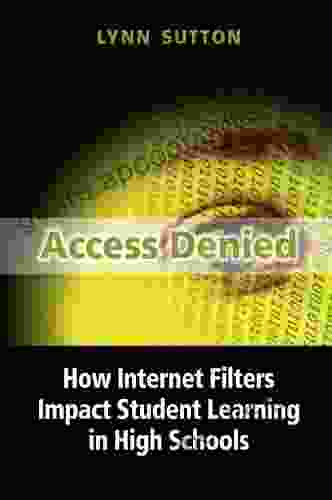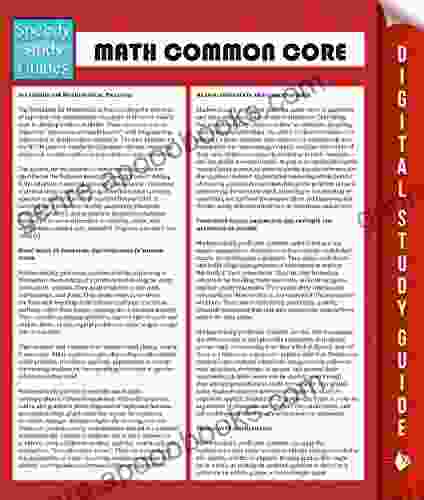Internet Filters: The Impact on Student Learning in High Schools

Internet filters are a common tool used in high schools to protect students from online dangers such as pornography, violence, and cyberbullying. However, some experts argue that these filters can also have a negative impact on student learning.
This article explores the research on internet filters and their impact on student learning. We will discuss the different types of internet filters, the potential benefits and drawbacks of using them, and provide recommendations for schools on how to use internet filters in a way that minimizes their negative impact.
There are two main types of internet filters:
5 out of 5
| Language | : | English |
| File size | : | 324 KB |
| Text-to-Speech | : | Enabled |
| Screen Reader | : | Supported |
| Enhanced typesetting | : | Enabled |
| Word Wise | : | Enabled |
| Print length | : | 82 pages |
- Content filters block access to websites and other online content that is considered inappropriate for students.
- Connection filters block access to the internet altogether.
Content filters are the most common type of internet filter used in schools. These filters use a variety of techniques to identify and block inappropriate content, such as:
- Keyword filtering: This type of filter blocks access to websites and other online content that contains specific keywords.
- URL filtering: This type of filter blocks access to websites and other online content that are located at specific URLs.
- Image filtering: This type of filter blocks access to images that are considered inappropriate for students.
Connection filters are less common than content filters. These filters simply block access to the internet altogether. This type of filter is often used in schools where students are not allowed to access the internet for any reason.
There are a number of potential benefits to using internet filters in schools. These benefits include:
- Protecting students from online dangers: Internet filters can help to protect students from online dangers such as pornography, violence, and cyberbullying.
- Improving student focus: Internet filters can help to improve student focus by blocking access to distracting websites and other online content.
- Increasing student productivity: Internet filters can help to increase student productivity by blocking access to websites and other online content that is not related to schoolwork.
There are also a number of potential drawbacks to using internet filters in schools. These drawbacks include:
- Blocking access to legitimate educational content: Internet filters can sometimes block access to legitimate educational content that is not considered inappropriate for students. This can make it difficult for students to complete their schoolwork.
- Creating a false sense of security: Internet filters can create a false sense of security by giving parents and school administrators the impression that students are protected from all online dangers. This can lead to students taking risks online that they would not otherwise take.
- Violating students' privacy: Internet filters can violate students' privacy by monitoring their online activity. This can make students feel uncomfortable and distrustful of their school.
Schools that are considering using internet filters should carefully weigh the potential benefits and drawbacks. If a school decides to use internet filters, it is important to do so in a way that minimizes their negative impact. The following are some recommendations for schools on how to use internet filters in a way that minimizes their negative impact:
- Use a content filter instead of a connection filter. Content filters are less restrictive than connection filters and allow students to access legitimate educational content.
- Use a filter that is appropriate for the age and maturity level of students. Filters that are too restrictive can block access to legitimate educational content and create a false sense of security.
- Inform students and parents about the internet filter. This will help to build trust and understanding between the school and the community.
- Monitor the internet filter regularly. This will help to ensure that the filter is working properly and is not blocking access to legitimate educational content.
Internet filters can be a useful tool for protecting students from online dangers. However, it is important to use internet filters in a way that minimizes their negative impact on student learning. Schools should carefully weigh the potential benefits and drawbacks of using internet filters and should use filters in a way that is appropriate for the age and maturity level of students.
5 out of 5
| Language | : | English |
| File size | : | 324 KB |
| Text-to-Speech | : | Enabled |
| Screen Reader | : | Supported |
| Enhanced typesetting | : | Enabled |
| Word Wise | : | Enabled |
| Print length | : | 82 pages |
Do you want to contribute by writing guest posts on this blog?
Please contact us and send us a resume of previous articles that you have written.
 Book
Book Novel
Novel Page
Page Chapter
Chapter Text
Text Story
Story Genre
Genre Reader
Reader Library
Library Paperback
Paperback E-book
E-book Magazine
Magazine Newspaper
Newspaper Paragraph
Paragraph Sentence
Sentence Bookmark
Bookmark Shelf
Shelf Glossary
Glossary Bibliography
Bibliography Foreword
Foreword Preface
Preface Synopsis
Synopsis Annotation
Annotation Footnote
Footnote Manuscript
Manuscript Scroll
Scroll Codex
Codex Tome
Tome Bestseller
Bestseller Classics
Classics Library card
Library card Narrative
Narrative Biography
Biography Autobiography
Autobiography Memoir
Memoir Reference
Reference Encyclopedia
Encyclopedia Yehuda Pinchover
Yehuda Pinchover Susan Wise Bauer
Susan Wise Bauer Martin A Dyckman
Martin A Dyckman Marco Chu Kwan Ching
Marco Chu Kwan Ching Mark Noce
Mark Noce Sebastian Mallaby
Sebastian Mallaby Scott Dodson
Scott Dodson Marie James
Marie James Yoko Danno
Yoko Danno Randall L Boykin
Randall L Boykin Gill Blanchard
Gill Blanchard Sally Clarkson
Sally Clarkson Lynn F Jacobs
Lynn F Jacobs Sam Minot
Sam Minot Oliver Kent
Oliver Kent Nick Clausen
Nick Clausen Pamela Warren
Pamela Warren Nicholas Goedert
Nicholas Goedert Mahanidhi Swami
Mahanidhi Swami Rick Warren
Rick Warren
Light bulbAdvertise smarter! Our strategic ad space ensures maximum exposure. Reserve your spot today!

 Adrian WardShar Pei Dog Care, Behavior, Diet, Interaction, Costs, and Health Care: The...
Adrian WardShar Pei Dog Care, Behavior, Diet, Interaction, Costs, and Health Care: The...
 Wesley ReedBirth Affirmations: The Picture Book That Will Empower You Through Pregnancy,...
Wesley ReedBirth Affirmations: The Picture Book That Will Empower You Through Pregnancy,... Don ColemanFollow ·9.5k
Don ColemanFollow ·9.5k Dylan HayesFollow ·10.1k
Dylan HayesFollow ·10.1k Asher BellFollow ·18.6k
Asher BellFollow ·18.6k Casey BellFollow ·12.3k
Casey BellFollow ·12.3k Jerome PowellFollow ·10k
Jerome PowellFollow ·10k Anton FosterFollow ·15.1k
Anton FosterFollow ·15.1k Manuel ButlerFollow ·19.5k
Manuel ButlerFollow ·19.5k Wade CoxFollow ·4.5k
Wade CoxFollow ·4.5k

 Finn Cox
Finn CoxCarmen Suite For Flute Quartet (G Alto Flute) ( Carmen...
Experience the Magic of...

 Andy Cole
Andy ColeUncover Hidden Truths: A Comprehensive Guide to Detecting...
: The Silent...

 Ken Simmons
Ken SimmonsUnleash Your Potential: Transform Frustration and...
Are you tired of feeling...

 Rick Nelson
Rick NelsonHard To Kill: A Gripping Thriller That Will Keep You on...
Tom Rollins is a...

 Ivan Turner
Ivan TurnerUnleash the Power of Your Breath: Discover Breath...
In the tapestry of life, where stress and...
5 out of 5
| Language | : | English |
| File size | : | 324 KB |
| Text-to-Speech | : | Enabled |
| Screen Reader | : | Supported |
| Enhanced typesetting | : | Enabled |
| Word Wise | : | Enabled |
| Print length | : | 82 pages |










